Detergent Scents are Making Your Clothes Smell Worse – Here’s Why
-
 By
Sophia Grant
By
Sophia Grant
Doing the laundry can be a bit of a chore. After all, gathering and sorting out our garments isn’t exactly fun. Still, it’s just one of those things that we have to do. At the end of the day, no one wants to be stuck wearing dirty clothes!
There’s more than one way to wash everything; we can either do it the old fashioned way in the sink or use the washer. No matter which method you use, however, you’ll have to reach for a certain product—that’s right, laundry detergent.
Why Using Laundry Detergent is Important
Laundry detergent is a necessity when it comes to doing the laundry. It simply wouldn’t be possible to just wash away all the sweat and dirt with plain water. No matter what we do, we’d have to add some sort of soap to “pull” the gunk away from the fabric.
The truth is, laundry detergents contain certain ingredients that make the process possible. First and foremost, they contain surfactants—these substances allow water to interact with the grease and oils on the fabric. In other words, they draw out the grime out of the fibers. From there, all the icky stuff is rinsed away when the water is drained.
Different Types of Laundry Detergent
As you probably already know, there’s more than one type of laundry detergent out there.
Powder detergents are perhaps the most traditional out of the different types. Highly effective, they generally come in small boxes. Given that they’re a dry powder, they tend to have a longer shelf life than their liquid counterparts. The main drawback, though, is that they can leave residue on clothes if not dissolved into water properly.
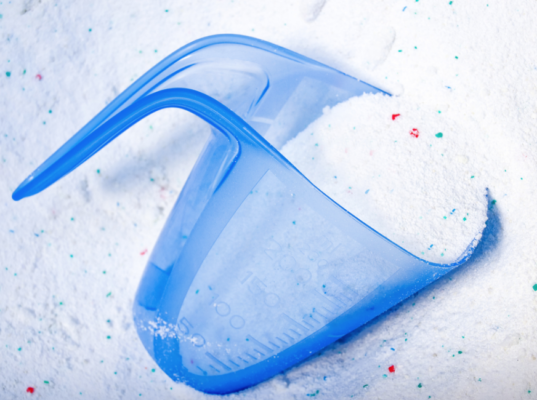
Liquid detergents are simple to use in that all you have to do is pour them into the water. Because of this, however, they’re also easy to overuse (i.e. pour too much), which can lead to deposits.
Too Much Detergent Will Cause Your Clothes to Smell Bad
As it turns out, too much detergent can actually make your clothes smell bad. Why? It allows the fabric to hold onto the dirt and grime that you’re trying to wash off. Now you might be thinking—”how is that possible?”. The truth is, all of the detergent will cause a layer of foam to form on the fabric, which will prevent it from being rinsed away.
Ultimately, it is the contaminants in the clothing fibers that are responsible for the odors. As you might be aware, these microorganisms love to grow and proliferate in moist environments—including clothing. The wetter, the better. Left to linger, they will do what they do best; that is, to break down certain substances, that will lead to the development of icky odors.
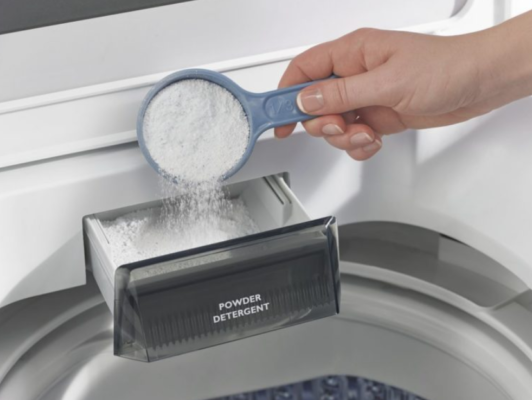
For this reason, you always want to make sure that you’re using the proper amount of detergent (i.e. according to the instructions on the packaging). Do not trust yourself and eyeball the amount. You’ll be surprised how easy it is to add too much! The worst part is that it’s not always obvious that you’re pouring too much—that is, until everything starts to smell afterward.
But My Detergent Has Added Fragrances!
Many detergents come with fragrances that are designed to give your laundry that “fresh” smell. As wonderful as they may be, however, it won’t do you any good if you’ve added too much. Like we explained earlier, the detergent will trap in the gunk (e.g. sweat, body oils, dirt) fragrance or no fragrance. If anything, your clothes will have both the “icky laundry smell” and the added fragrance. Definitely not the ideal situation if you ask me!
My Clothes Smell Bad, What Should I do?
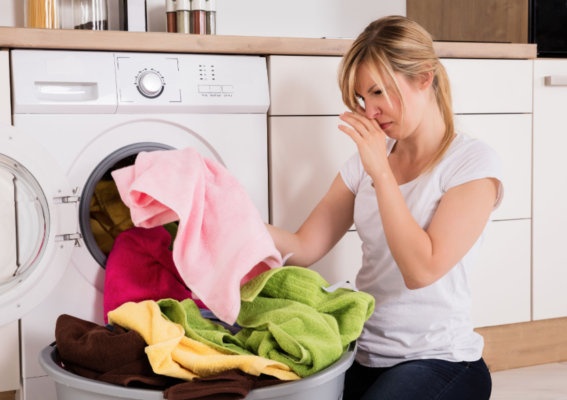
Do your clothes smell bad? Have a hunch that there’s detergent residue in the fabric? If so, what you want to do is to rinse it out. Fill a tub or sink with plain water and put your garments in. Immerse it fully into the liquid and press up and down on the fabric to remove the excess soap. Repeat until there are no more suds.
If the smell is too bad, you might also have to wash it again. Don’t worry—as long as you use the proper amount of laundry detergent, you’ll be fine!
Other Reasons Why You Shouldn’t Use Too Much Detergent
…and that’s just one of the reasons why you don’t want to add too much laundry detergent. There are several other things that you want to consider before pouring the powder or liquid into your washer.
It Can Cause Skin Irritation
When you use too much detergent, it tends to remain in the clothing fibers. In other words, it can be difficult to wash away—even if you’re using a rinse cycle. With all the deposit that’s left on the garment, it’s not uncommon for it to eventually cause skin irritations.

After all, laundry detergents are essentially a cocktail of chemicals. Expose your skin to these chemicals on a regular basis and it will start to get irritated! It can be particularly bad with close-fitting clothes such as bras or compression layers.
It Can Reduce the Efficacy of Your Washing Machine
Did you know that using too much laundry detergent can actually make your washing machine less effective? Ultimately, this is due to all of the foam that’s generated from the soap. Most machines will simply not be able to handle all of the suds. As a matter of fact, it can even back up into the hoses, which would require a visit from the repairman.
Most modern washing machines nowadays will display an error code if there is such a problem.
It Can Make Your Washer Smell Bad
Too much detergent won’t just make your clothes smell bad, it’ll make your washing machine smell bad too!
Over time, the ingredients from the detergent can build up under the wash tub in an area that isn’t exactly visible. Given the chance, this gooey residue will start to collect debris such as dirt. Before you know it, it’ll be a hotbed for contaminants which can cause nasty doors.
Considering this, it’s generally recommended that you clean your washing machine on a regular basis. Ideally, you want to do so at least once a month (even if you don’t use too much laundry detergent)!
It’s Harmful to the Environment
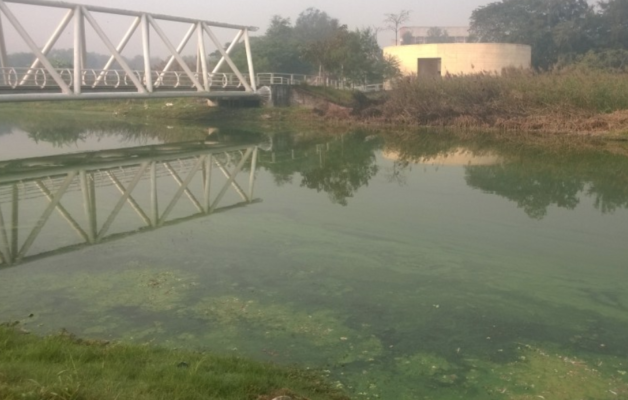
It shouldn’t come as a surprise that too much detergent is bad for the environment. After all, everything is released into the waterways when you do laundry—including the chemicals that are used in the product. The situation tends to be particularly bad with those that have added fragrances.
Want to do your part in protecting the environment? If so, try to minimize the amount of detergent that you’re using. Always use a measuring cap to determine the exact amount; never “eyeball” it. Or better yet, you can switch to an all-natural laundry detergent. Yes, they exist! Take ACTIVE detergent, for instance—the formula is plant-based and does not contain any harsh chemicals that would be bad for our sewage systems.
You’ll be Spending More Money in the Long Run
This might be obvious but you will be spending more money on laundry detergent in the long run. After all, you’ll be going through the pack or bottle much more quickly. Want to save some money? If so, remember just to use the appropriate amount for your clothes.
15% Off Amazon Coupon
×Click To Reveal The 15% Off Coupon Code For Your Entire ACTIVE Purchase At Amazon.com
Note: This promotional offer is only guaranteed through the end of the day.


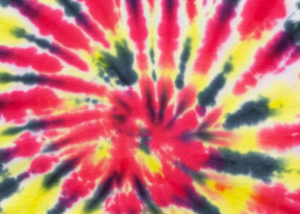


Comment (1)
Dealing with the issue at the moment. I’ve been googling for about a month for a solution and today 6/18/2019 I found your article. Thanks for the insightful advice!